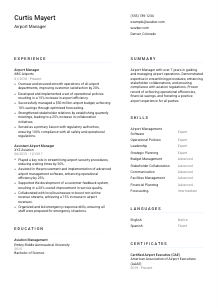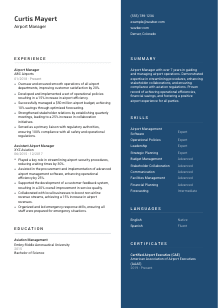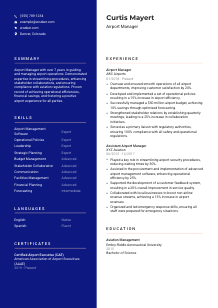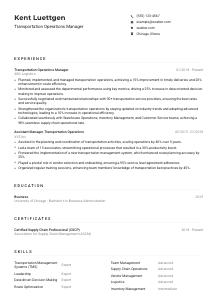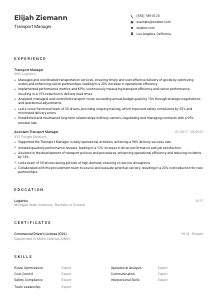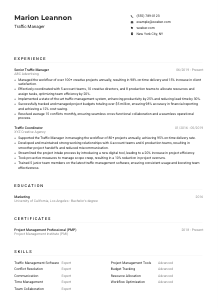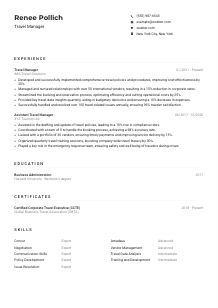Airport Manager Resume Example
Navigating terminals, but your resume seems grounded? Take off with this Airport Manager resume example, prepared using Wozber free resume builder. Discover how to sync your aviation expertise with managerial acumen, ensuring your career trajectory reaches new heights!
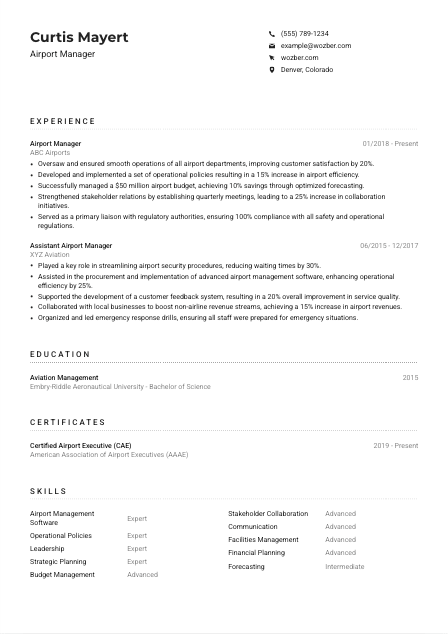
How to write an Airport Manager resume?
Hello, aspiring Airport Manager! The journey to capturing your dream airport management role starts here. Your resume isn't just a document; it's your runway to a successful career in aviation. With the precision of an air traffic controller, we're going to guide your resume through the busy airspace of competition, straight into the hiring manager's radar.
Using Wozber's free resume builder, we'll show you how to make your resume ATS-compliant and ensure it lands safely in the 'interview' pile. Buckle up and get ready to take off!
Personal Details
Just like a flight plan, your Personal Details section sets the course for your resume's journey. Here, relevance and clarity are key to ensuring a smooth departure. Let's navigate the best way to present your foundational details for the Airport Manager position.
1. Command Attention With Your Name
Begin by ensuring your name is the beacon on your resume, guiding recruiters through the document. Use a bold, clear font to make it stand out, symbolizing the grounded confidence and leadership expected of an Airport Manager.
2. Tailor Your Title
Immediately beneath your name, align yourself with your ambition by including the title "Airport Manager". This strategic alignment signals to the ATS and hiring managers alike that your career trajectory is set towards management in aviation.
3. Ensure Smooth Communication Channels
List only essential contact information to keep the communication lines clear and straightforward. A professional email and a reliable phone number are your direct lines. Mirror the professionalism of an Airport Manager in every detail, including an email address that reflects your name professionally.
4. Confirm Your Base Location
"Must be located in Denver, Colorado." Highlighting Denver, Colorado, as your location immediately addresses one of the job's logistical requirements, assuring the employer of your readiness and eliminating any concerns about relocation.
5. Digital Presence: Your Professional Hangar
A well-maintained LinkedIn profile or personal website can serve as a hangar for your professional achievements — showcasing projects and endorsements. Ensure any included profiles are polished and reflect the same professionalism as your resume.
Takeaway
With your Personal Details section set for takeoff, you've laid a solid foundation. Like a successful pre-flight checklist, this section ensures that you're starting your journey on the right foot, signaling to recruiters that you're prepared for the role of Airport Manager.





Experience
In the control tower of your resume, the Experience section is where you direct your career trajectory. It's here that you'll showcase your ability to manage the bustling world of airport operations, much like a seasoned pilot showcases their flight hours.
- Oversaw and ensured smooth operations of all airport departments, improving customer satisfaction by 20%.
- Developed and implemented a set of operational policies resulting in a 15% increase in airport efficiency.
- Successfully managed a $50 million airport budget, achieving 10% savings through optimized forecasting.
- Strengthened stakeholder relations by establishing quarterly meetings, leading to a 25% increase in collaboration initiatives.
- Served as a primary liaison with regulatory authorities, ensuring 100% compliance with all safety and operational regulations.
- Played a key role in streamlining airport security procedures, reducing waiting times by 30%.
- Assisted in the procurement and implementation of advanced airport management software, enhancing operational efficiency by 25%.
- Supported the development of a customer feedback system, resulting in a 20% overall improvement in service quality.
- Collaborated with local businesses to boost non‑airline revenue streams, achieving a 15% increase in airport revenues.
- Organized and led emergency response drills, ensuring all staff were prepared for emergency situations.
1. Navigate Through Job Requirements
To begin your ascent, closely examine the job posting. Highlight key phrases such as "oversaw all airport operations" and "managed airport budget." These will serve as your navigational beacons, guiding the content of your experience section.
2. Plot Your Career Coordinates
Organize your professional history in a chronologically descending order, with your latest role receiving top billing. This layout helps hiring managers to quickly understand your career trajectory and readiness for the role of Airport Manager.
3. Declare Your Achievements
For each role, detail how you contributed to operational efficiencies, stakeholder satisfaction, and financial savings, mirroring the job description. Use bullet points for clarity, and begin each with a powerful action verb to create dynamism in your resume.
4. Altitude and Figures
Numbers provide scale and perspective. Did you improve customer satisfaction by 20%? Manage a team of 50? Oversee a budget of $50 million? Such metrics offer tangible proof of your capabilities and achievements.
5. Maintain Relevance in Your Flight Log
To ensure every entry in this section contributes to your narrative as an Airport Manager, keep your content relevant. Sidestep unrelated roles or achievements that don't align with the core responsibilities of airport management.
Takeaway
Your Experience section is now a comprehensive logbook, articulating your career journey with precision and relevance. Each entry serves to convince the hiring managers of your mastery in the field of airport management, positioning you as the ideal candidate.
Education
Flight training is to a pilot what education is to your career in Airport Management. This section underscores your foundational knowledge and preparedness for the complexities of airport operations.
1. Identify Your Educational Waypoints
"Bachelor's degree in Aviation Management, Business Administration, or a related field" is your first waypoint. Ensuring your education aligns with this requirement is crucial for ATS optimization and demonstrating your eligibility for the position.
2. Draft Your Educational Flight Plan
Present your educational background succinctly. List your degree, the institution where you earned it, and your graduation year. This straightforward format ensures the essential details are easy to find and verify.
3. Align Your Degree With Job Demands
If your degree directly matches one suggested in the job description, make sure it's prominently displayed. For instance, "Bachelor of Science in Aviation Management" precisely matches the preferred criteria, instantly affirming your suitability.
4. Include Relevant Courses and Milestones
Relevant coursework or academic accolades can provide additional lift to your resume. Mention these if they add depth to your expertise, especially in areas directly related to airport management.
5. Continuous Learning: Your Career Altitude Adjuster
In the ever-evolving field of aviation, continuous learning reflects your commitment to staying at the forefront. While this section may lean more on formal education, don't hesitate to mention recent workshops or seminars related to airport management.
Takeaway
With your education section carefully charted, you demonstrate not just your readiness based on past learning but also your commitment to future growth. It's an essential part of your story, showing that you have the academic foundation to support your career flight plan.
Certificates
Just as a pilot collects ratings and endorsements, professional certifications in the field of airport management can significantly elevate your resume. Let's navigate through highlighting certifications that enhance your candidacy.
1. Identify Critical Certifications
Using our example, the "Certified Airport Executive (CAE)" credential stands out as a preferred qualification. Specifying such industry-recognized certifications directly aligns with the job requirements, showcasing your commitment and expertise.
2. Highlight Relevant Certifications
List certifications that are most relevant to the job you're applying for. This focus ensures that hiring managers immediately see the qualifications that make you an exceptional candidate for the Airport Manager position.
3. Date and Validate Your Certifications
Ensure that your certifications are up to date and include issuance dates to provide a timeline of your professional development. This transparency validates your qualifications and shows a trajectory of continuous improvement.
4. Pursue Continuous Certification
The aviation field is dynamic, with evolving standards and practices. Demonstrating an ongoing pursuit of relevant certifications shows a proactive approach to your professional development, keeping you ahead in your career.
Takeaway
Your certificates serve as powerful indicators of your qualifications and dedication to the field of airport management. By carefully selecting and presenting these certifications, you reinforce your suitability and readiness for the role.
Skills
In the cockpit of your career, skills are the controls that enable you to navigate complex situations. Your skills section should showcase the specialized abilities and competencies that make you the ideal candidate for the Airport Manager role.
1. Decode the Job Description for Skills
Begin by identifying both the explicit and implicit skills demanded by the role. Look for clues in the job description, such as "proficiency in airport management software" and "strong leadership skills", to form a baseline for your own skills section.
2. Align Your Skill Set
Make a list of your skills that directly match those requested in the job description. Prioritize those that are most applicable to the position of an Airport Manager, ensuring your resume resonates with the specific demands of the role.
3. Organize and Prioritize
Rather than listing every skill you possess, focus on those that are most pertinent to airport management. This targeted approach prevents your key skills from being lost in a sea of irrelevant abilities, making it easier for hiring managers to see your suitability.
Takeaway
Your skills section now effectively communicates the unique capabilities you bring to the role of Airport Manager. This concisely curated list ensures that hiring managers understand at a glance why you are the exceptional candidate they are seeking.
Languages
In the global arena of airport management, multilingualism can be a significant asset, offering a clear advantage in communicating with diverse teams and international stakeholders.
1. Evaluate the Job's Language Demands
If the job description mentions specific language requirements, these should be at the forefront of your Languages section. Even if no preferences are stated, consider the operational environment of the airport and the potential benefits of additional languages.
2. Prioritize Relevant Languages
List your language proficiencies starting with those most relevant to the position. For instance, if the Airport Manager position involves frequent interactions with international authorities, highlighting proficiency in languages besides English, such as Spanish, could be a boon.
3. Assess and Display Proficiency Levels
Be accurate in assessing your language skills, using terms like "native," "fluent," or "intermediate" to describe your proficiency. This honesty will help set realistic expectations for your role as an Airport Manager.
4. Recognize the Value of Every Language
Even if certain languages don't directly apply to the job at hand, don't hesitate to list them. Each language you speak is a testament to your ability to learn and adapt – valuable skills in any managerial position.
5. Embrace Your Linguistic Diversity
Your multilingual abilities highlight your preparedness for an increasingly globalized world. By confidently presenting your language skills, you position yourself as a forward-thinking and versatile Airport Manager.
Takeaway
Your proficient, well-balanced Languages section offers a panoramic view of your communication skills and cultural adaptability, positioning you as a globally minded Airport Manager. This adds an invaluable dimension to your candidacy in a diverse and dynamic airport environment.
Summary
Think of your Summary section as the captain's pre-takeoff announcement – an opportunity to reassure and excite your passengers about the journey ahead. This is your chance to encapsulate your qualifications and strategic vision for the role of Airport Manager in a few compelling lines.
1. Capture the Role's Essence
Reflect on the critical aspects of the job and how your background aligns with these responsibilities. Your understanding of operational efficiencies, financial management, and stakeholder engagement are your ammo. Load these efficiently into your summary.
2. Assert Your Professional Identity
Start with a strong introduction that positions you as a definitive Airport Manager, demonstrating your command over this intricate field and your ability to pilot an airport's operations to success.
3. Highlight Your Unique Contributions
Select two or three of your most impressive achievements that directly relate to the key responsibilities of an Airport Manager. Make it clear why these accomplishments matter, showcasing your impact on previous operations.
4. Maintain Brevity and Impact
Your summary should be a distilled essence of your career, capturing your significant contributions and vision for future roles. Aim for clear, concise communication, striking a balance between brevity and substance.
Takeaway
With your compelling summary, you've made a strong pre-flight announcement to your potential employers, showcasing why you're the captain they need for their Airport Manager position. It's time to taxi to the runway; your career in airport management is cleared for lift-off.
Launching Your Airport Manager Journey
Congratulations! You're now equipped to craft an Airport Manager resume that not only lands in the right stack but also ensures your boarding pass to the interview round. Remember, every section of your resume is a gate you need to clear confidently. Use Wozber's free resume builder, including its ATS-friendly resume templates and ATS resume scanner, to ensure your resume is optimized and ready to clear any obstacles.
You've plotted your course — now it's time to soar into your future with confidence. The skies are waiting.

- Bachelor's degree in Aviation Management, Business Administration, or a related field.
- A minimum of 5 years of experience in airport operations or management.
- Proficiency in relevant airport management software and Microsoft Office Suite.
- Strong leadership and communication skills.
- Certification from the American Association of Airport Executives (AAAE) preferred.
- Candidate must have excellent English skills.
- Must be located in Denver, Colorado.
- Oversee all airport operations, including facilities management, security, and customer service.
- Develop and implement operational policies and procedures to ensure the airport operates efficiently and in compliance with all regulations.
- Manage airport budget, forecasting, and financial planning.
- Collaborate with local stakeholders, airlines, and government entities to ensure a positive airport experience for all parties.
- Serve as the primary liaison between the airport and relevant regulatory authorities.





